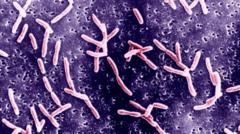In a worrying health crisis, the Indian city of Pune is witnessing a surge in cases of Guillain-Barre Syndrome (GBS), a rare neurological disorder where the immune system mistakenly attacks the body's nerve cells. This alarming trend has raised concerns following approximately 160 reported cases since January and five suspected fatalities.
The outbreak began last month when a school teacher noticed her six-year-old son struggling to hold a pencil, initially attributing it to frustration over homework. Within days, the child was admitted to intensive care, manifesting severe symptoms, including loss of ability to move, swallow, and breathe. Fortunately, he is currently recovering.
Reports indicate that the outbreak primarily affects the Pune region, a budding education and IT hub surrounded by industrial areas, with many patients requiring intensive medical care. Presently, out of 160 cases, 48 individuals remain in critical condition, with 21 on ventilators. The health authorities are closely monitoring these developments as they investigate the origin of these cases.
The pathogen campylobacter jejuni, a leading cause of foodborne illnesses globally, is suspected to be the source of the current GBS cases. Historical data links this pathogen to similar outbreaks, particularly in cases where children interacted with contaminated water or poultry. Scientists note that a particular strain of campylobacter may be prevalent in Pune, significantly contributing to the recent increase in GBS cases.
Notably, GBS is not unfamiliar in India. A 2019 review of GBS patients at the National Institute of Mental Health and Neurosciences (NIMHANS) documented a significant correlation between the syndrome and campylobacter infections. Other countries, such as Peru, have reported spikes in GBS cases tied to this pathogen, highlighting the global implications of this outbreak.
Health experts emphasize the unique nature of developing GBS, which occurs in rare instances where molecular mimicry occurs between campylobacter strains and human nerve cells. The overall incidence of GBS from these infections is estimated at approximately one in 10,000.
Treatment remains a challenge as there is currently no definitive cure for GBS. Medical interventions often involve plasma exchange and intravenous immunoglobulin to manage symptoms and accelerated recovery. The diagnosis relies heavily on clinical observation, often prone to delays and misinterpretations, especially in under-resourced areas.
In response to the ongoing outbreak, health authorities in Pune have launched extensive public health campaigns, urging residents to drink boiled water and avoid undercooked poultry in attempts to curtail the spread of the harmful bacteria. WHO teams are actively collaborating with local health officials to track and mitigate the outbreak effectively.
As Pune grapples with this unsettling health crisis, health officials continue to reassure the public while advocating for cautious dietary practices and vigilance regarding symptoms, underscoring the urgent need for awareness and prompt medical attention in the face of this mysterious outbreak.






















